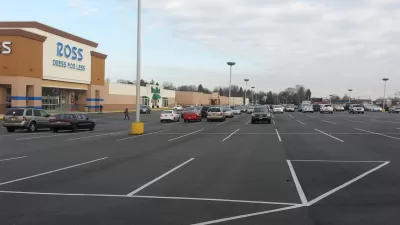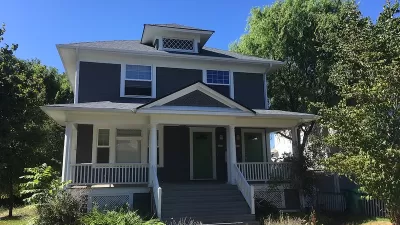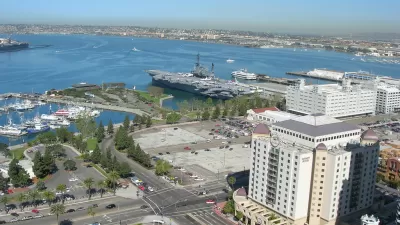For years, Strong Towns readers have been pointing out the vast empty parking lots on the busiest shopping day of the year as evidence of poor land use regulations. Now the #iwishthisparkingwas hashtag imagines a different future.

If the number of flights in the air and cars on the road on the days leading up to Thanksgiving is any indication, Black Friday will be holiday business as usual for many (not all) Americans. That means massive mall parking lots will still not be nearly full in many parts of the country, and probably even less full than usual.
The Strong Towns team has for years spearheaded the #BlackFridayParking social media campaign to raise awareness about the overabundance of parking, even on the busiest shopping day of the year, in most U.S. retail developments. This year, however, with the pandemic upending travel patterns and keeping many people at home, either voluntarily or by force of law, the Strong Towns team is introducing a new angle to the exercise. Daniel Herriges explains:
Photographing largely empty big-box lots in 2020 might not have the same impact as in years past: Of course that parking is empty this year, many will say.
Instead of excusing the country's parking addiction, the pandemic shows how much more productive cities would be without devoting so much space to the storage of private automobiles, according to Herriges. So in this strangest and most tragic of years, the Strong Towns is asking #BlackFridayParking participants to add another layer of meaning to the exercise by adding the #iwishthisparkingwas hashtag.
We want to know what you’d like to see instead of all that parking in your city. And it doesn’t have to be retail parking this year—public, private, any sort of use is fair game. Show us a place where there’s too much parking, but more importantly, tell us (or even illustrate for us, if you’re artistically inclined!) exactly what we’re missing out on by not taking a more flexible, adaptable approach to that space.
If you're looking for inspiration, new open space created in a time of isolation and sedentary living, emergency zoning reform to support restaurant and retail businesses, and transit service changes designed to keep essential workers moving have already achieved an unprecedented encroachment of activity on space previously reserved for cars. Though the transfer of power from car to everything has been surprisingly smooth for much of the pandemic, political support for such efforts has also begun to wain in some parts of the country, so here is another opportunity to imagine a world without so much parking.
FULL STORY: Show us what you wish your city would do with *all* that parking!

Planetizen Federal Action Tracker
A weekly monitor of how Trump’s orders and actions are impacting planners and planning in America.

Map: Where Senate Republicans Want to Sell Your Public Lands
For public land advocates, the Senate Republicans’ proposal to sell millions of acres of public land in the West is “the biggest fight of their careers.”

Restaurant Patios Were a Pandemic Win — Why Were They so Hard to Keep?
Social distancing requirements and changes in travel patterns prompted cities to pilot new uses for street and sidewalk space. Then it got complicated.

Platform Pilsner: Vancouver Transit Agency Releases... a Beer?
TransLink will receive a portion of every sale of the four-pack.

Toronto Weighs Cheaper Transit, Parking Hikes for Major Events
Special event rates would take effect during large festivals, sports games and concerts to ‘discourage driving, manage congestion and free up space for transit.”

Berlin to Consider Car-Free Zone Larger Than Manhattan
The area bound by the 22-mile Ringbahn would still allow 12 uses of a private automobile per year per person, and several other exemptions.
Urban Design for Planners 1: Software Tools
This six-course series explores essential urban design concepts using open source software and equips planners with the tools they need to participate fully in the urban design process.
Planning for Universal Design
Learn the tools for implementing Universal Design in planning regulations.
Heyer Gruel & Associates PA
JM Goldson LLC
Custer County Colorado
City of Camden Redevelopment Agency
City of Astoria
Transportation Research & Education Center (TREC) at Portland State University
Camden Redevelopment Agency
City of Claremont
Municipality of Princeton (NJ)





























